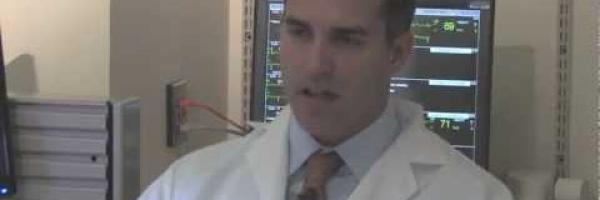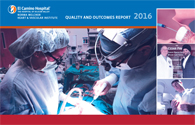Heart Rhythm Disorders Care
A heart rhythm disorder, called an arrhythmia, is characterized by a heartbeat that’s too fast, too slow or uneven. At the Norma Melchor Heart & Vascular Institute at El Camino Health, our arrhythmia specialists are dedicated to providing you with the latest advances in arrhythmia treatment. Our professionals commonly participate in clinical trials to discover new therapies and improve the quality of life for people living with arrhythmias.
El Camino Health’s electrophysiology lab is equipped with sophisticated diagnostic tools. Our professionals can perform some of the latest techniques to treat arrhythmias, including minimally invasive catheter ablation and implantable devices with remote monitoring.
Your doctor can develop a customized treatment plan to manage your condition, drawing from some of the latest therapies available.
Advanced Diagnosis: Electrophysiology Study (EPS)
Your doctor may use an electrophysiology study (EPS) to assess your arrhythmia. An EPS study is performed using a thin, flexible wire that’s passed through a vessel in your upper thigh or arm to your heart to record your heart's electrical signals. Your doctor may give you an anti-arrhythmia medicine during the test to determine whether it can stop the arrhythmia.
Implantable Cardiac Devices
Implanted resynchronization devices are used to regulate the heartbeat. These small devices, which are placed just under the skin on your chest, send electrical signals to your heart to treat the arrhythmia. A pacemaker is used to regulate a slow heartbeat, and an implantable cardioverter defibrillator (ICD) is used to regulate a fast heartbeat.
Implanted devices have been used since the 1990s, and the technology continues to improve. At El Camino Health, our arrhythmia specialists use advanced equipment that allows them to monitor your device’s performance and your health status. Real-time data allow your doctor to customize the device to meet your specific needs.
The Next-Generation Cardiac Defibrillator
El Camino Health was the first Bay Area hospital to implant the next-generation cardiac defibrillator, called a cardiac-resynchronization-therapy defibrillator (CRT-D) to regulate a fast heartbeat. The improved device is safer, thinner and has a longer-lasting battery — seven years, compared with five years or fewer for older models — than comparable devices on the market.
Catheter Ablation and Cardiac Mapping
Catheter ablation, also called radiofrequency ablation, is one of the most commonly used treatments for all types of rapid heartbeats, including atrial fibrillation and ventricular tachycardia. This procedure uses radiofrequency energy to destroy a small area of heart tissue that’s causing the arrhythmia, which helps restore your heart’s regular heartbeat.
To perform ablation, your doctor makes a small incision in your arm or upper thigh and threads a catheter — a thin, flexible tube — into a vessel to the affected tissue in your heart. The catheter is fitted with a tiny electrode that emits an electrical pulse, which destroys the nerve cells that are causing the irregular heartbeat. The procedure is performed under mild sedation, so it’s relatively painless.
Radiofrequency ablation has a very high success rate and a low risk of complications, and you can resume regular activities in a few days. Arrhythmia specialists at El Camino Health have advanced 3-D mapping technology that uses CT imaging to provide a better picture of your heart and vessels. This mapping system allows your doctor to maneuver the catheter with greater accuracy, which further minimizes the risk of complications.
Advanced Care for Atrial Fibrillation
People with atrial fibrillation (AF) are at greater risk of stroke because their atrium doesn’t beat properly, which allows blood to pool in the heart. This can cause clots to form, which can lead to stroke, which is often more severe in those with AF.
One of the most common stroke-reduction treatments in people with AF is blood-thinning medicine. However, long-term use of blood thinners can cause bleeding complications, and some people have difficulty tolerating these medicines long term.
El Camino Health offers advanced treatments to provide people with AF a better quality of life and reduce the risk of stroke.
WATCHMAN Procedure
El Camino Health is one of only two hospitals in Northern California offering the WATCHMAN™ Implant to treat AF. This tiny heart device can lower the risk of stroke using a single, minimally invasive procedure that offers an alternative to taking blood thinners.
LARIAT Procedure
This minimally invasive therapy can be particularly effective for those with AF who are unable to take blood-thinning medications. To perform the procedure, surgeons use catheters to create a loop that seals off the LAA from the rest of the heart using the LARIAT® Suture Delivery Device. The device helps prevent blood clots from leaving the LAA and causing a stroke. The Norma Melchor Heart & Vascular Institute at El Camino Health is among the first Bay Area centers to perform the procedure.
Maze Procedure
Surgical ablation, also called maze heart surgery, is an advanced surgical method that can be used to treat AF. The surgeon makes incisions in the atrium in a maze pattern and immediately closes the incisions. The electrical impulses that cause the arrhythmia can’t cross the incisions, so impulses follow a single path through the maze of scar tissue. This prevents irregular electrical activity and restores normal heart rhythm.
Our arrhythmia experts can perform this as an open heart procedure, as well as a minimally invasive approach that only requires a few small incisions on each side of your chest — which may offer a shorter hospital stay and a faster recovery.

